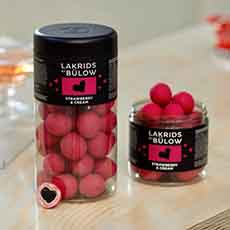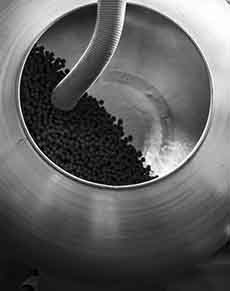|
Licorice lovers: You are about to discover a licorice so delicious, gourmet licorice that will take your palate to a new height of appreciation—and exquisite satisfaction. A number of years ago in Denmark, Johan Bülow, a young man seeking an entrepreneurial opportunity, decided to focus his attention on licorice (lakrids in Danish), a Scandinavian favorite that he felt could be raised to a higher level. He spent long hours learning the craft of artisan licorice-making. He rented a factory and purchased a licorice machine. By 2007 he was ready to cook, roll and cut his very first product. Then, Johan and his production manager came up with the idea to coat the licorice with chocolate. They were told that it couldn’t be done. But persistence and the purchase of a panning machine* did the trick (see photo #6). They created The original, a licorice center coated with milk chocolate and a powdery finish. Trust us, it is addictive. On 07.07.07 (a lucky number), the first Lakrids by Johan Bülow shop opened in Svaneke, Denmark—a small town on the eastern coast of the Baltic island of Bornholm, Denmark. Johan’s idea was to cook the lakrids (the Danish word for licorice) in his shop, so that passersby could smell the aroma from as far away as 100 meters. Everything sold out in two hours. The last customer even bought the sample bowl on the counter! Having experienced Lakrids by Bülow in all glorious flavors, we understand why. National Licorice Day is April 12th. > The history of licorice. These are not strands or ropes of licorice. They are not artificially flavored. They are small balls of licorice enrobed in balls of chocolate. The total bite is about 3/4″ in diameter. They are just spectacular, nicely packaged, and offer beautiful gift assortments. A nice gift, but after you taste a jar, you’ll have trouble giving them away. Flavors vary by season. They also vary by “finish”: crispy, glossy, powdery, or plain. All are equally wonderful. The centers can be round, square (photo #5), or heart-shape (photo #3). The current flavors include: We tried six of the flavors, and while each was its own perfection, the one we emptied first was the Original, with its strong taste of milk chocolate. One of our colleagues chose the Coffee Kieni, which he took home to relish. The next day he said: “I should have left it here. I ate the whole container after dinner.” You can purchase them on the LakridsByBulow.com website. There’s also a selection on Amazon. Get a lot of them. The containers will soon be empty. Licorice is a confection flavored with the extract from the root of the licorice plant, combined with sugar or other sweetener and a binder (gelatin, gum arabic, or starch). The big American brands use corn syrup*. Additional ingredients can include flavoring, beeswax for a shiny surface, molasses to provide the familiar black color, and ammonium chloride. Some brands substitute anise oil instead of licorice root extract. The ingredients are dissolved in water and heated to 275°F, then poured into molds. The resulting pieces are sprayed with beeswax to make their surface shiny. Who knew? The original liquorice (the U.K. spelling) was black. Later, “red licorice” was made with strawberry flavoring. Today it is made in numerous flavors (as evidenced by Lakrids by Bülow). |
|
|
|
________________ *Panning is an old, artisan method of coating fruits, nuts, or any center with a chocolate coating. It is one of the oldest technical skills of chocolate making. Chocolate is slowly poured over the centers in a tumbling coating pan. The friction created by the tumbling action in the pan distributes the chocolate evenly over every center [source]. †Kieni is the small community in Kenya that provides the green coffee beans, which are roasted by Bülow.
|
||
Gourmet Licorice: Lakrids By Bulow Gourmet Licorice
← Older Post Newer Post →






